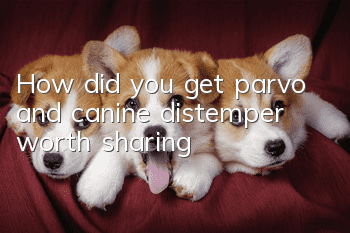How did you get parvo and canine distemper? (worth sharing)

Every puppy and dog carries corresponding virus sources, including parvovirus, canine distemper, etc. Just like humans carry cancer cells. If the diet, temperature, environment, etc. are not taken care of the day after tomorrow, it will cause an outbreak of pathogens in the body, and the dog will have diarrhea, coughing, sneezing, vomiting, etc. Then more and more later, it will be small, canine distemper. The same goes for humans. If you catch a cold, you will cough, sneeze, have a high fever, and if left untreated, you will develop pneumonia and other conditions.
1. Excessive reverse love is the cause of "small" problems
1. Feed milk. is the most serious mistake. As we all know, a person who does not drink milk often will have diarrhea after drinking milk one day. This is because a substance that breaks down milk in the body decreases with age, and children have the highest decomposition ability. If the puppy has been completely weaned and has not been fed other milk substitutes, then feeding the puppy milk after adoption is the first cause of "microbial growth".
2. Feed meat. It's the second reason. Two days ago, my neighbor bought a 45-day-old German Shepherd. He fed it "Baolu" soft-packed canned meat. I took a bite and it was very oily. Seen sparsely on the first day. This is a puppy food quality issue.
(Refined beef, mince it, add a little chicken essence, cook it into porridge, mix it with rice porridge at a ratio of 1:3 and feed it. It needs to be rotten)
3. Feeding leftover food to puppies aged 50-100 days is the third hazard. Dogs should not eat leftover food in their lives. No matter who left it, there are many ways to avoid wasting food. Dogs are by no means a trash can for leftover food.
4. Immunity failure. Go to a reputable pet hospital for vaccination. And the drug labels must be affixed on the "health certificate".
5. Sleep on the floor or in a bedding nest. It is also a very serious problem. People take off their clothes when they go to bed and put them on when they get up, otherwise they will catch a cold or cough. The same goes for dogs. If you sleep with a quilt on your back, your dog will catch a cold if you lift the quilt when you get up, and your colleagues will easily catch a cold. The same goes for sleeping on the floor.
(So it is recommended that puppies still use a cage. First, it can be fixed in a fixed place and let the dog get used to it. Second, the dog will not run around, eat random things, and will not catch cold in the place)
2. Fashion psychology is the cause of “canine distemper”
1. Show your puppy early.
2. Go out early to walk the dog. (Do not go out until you have completed all immunizations)
3. Throw food on the ground to feed the dog.
4. Failure to develop good dog walking habits when walking the dog
5. The puppy sniffs and bites everywhere.
6. Stand in one place and chat with others while walking the dog.
7. The puppy digs holes and eats dirt.
8. Immunity failure.
I often see posts about puppies having loose stools and bloody stools on forums. Many people will naturally think of small dogs. In fact, it is caused by a variety of factors
Generally speaking, four situations of loose stools in puppies can be summarized
1. Irregular food intake. Many puppies are 70% full after eating. Overeating after a change of environment causes enteritis
2. Insufficient heat preservation in autumn and winter, especially if you play on the stone floor for a long time, the soles of your feet will get cold and cause abdominal distension
3. Insufficient deworming leads to intestinal parasites
4. Viral enteritis, also known as parvovirus, is caused by coronavirus
Any of the above 123 items will induce parvovirus, that is, transform from bacterial enteritis to viral enteritis!
Not much else to say, as long as the owner pays attention, it can be avoided. Now I will just talk about my personal deworming process.
1. Parasites can be transmitted through the placenta. Therefore, the mother should be dewormed during estrus and try to avoid deworming during pregnancy.
2. Time to deworm puppies
20---25 For the first deworming, it is best to use the safer Qiba 100, and take the dosage according to the instructions.
10--15 days apart, the second deworming.
10--15 days apart, the third deworming.
10-15 days apart, the fourth deworming,
There is no need to be dogmatic about the deworming time and interval, it is determined based on the puppy’s mental state and physical condition. In the next 6 months, underage dogs should be dewormed once a month, and over 6 months old once a quarter
Special reminder: Domestic levamisole anthelmintic tablets are only suitable for adult dogs and are extremely toxic to puppies. Careless dosage can lead to death from poisoning!
Don’t just use one type of anthelmintic drug, use it in a targeted manner. As long as you use the medication correctly, your puppy will have no problems
The above medication time is best matched with the epidemic prevention time, and should be chosen about 3-5 days before epidemic prevention.
Remember, the dog vaccine is a weakened virus and can only be used after deworming and when the puppy is in the best health. Do not follow the vaccination time dogmatically. Only by doing all the preparations before epidemic prevention can you prevent the epidemic.
Personally, I think that if there are no external environmental influences, deworming is much more important than epidemic prevention!
It doesn’t matter whether you use the above personal experience or not. I hope everyone understands the importance of deworming
There are many reasons why puppies are physicallyPolygenic canine distemper and parvovirus often occur among puppies, and there are also pre-existing causes. What's more, canine distemper and parvovirus can be contagious. Let's analyze from some specific reasons why puppies are prone to canine distemper and parvovirus. Tiny?
Some people think that my puppy seldom goes out or does not go out at all, so he will not be infected. In fact, many viruses are carried by the dog itself when the puppy is born. Once the resistance is reduced, it will break out. Diarrhea is a small inducement, so even a puppy that does not go out may get sick. Some people think that if dogs were raised in the past, they would still be able to raise them well if there were no vaccines or dog food. In fact, with the sharp increase in the number of dogs, infectious diseases are also developing rapidly.
A puppy just bought from a dog dealer has weak immunity, poor environment, improper care, and poor physical foundation. After arriving home, you should first go to a reliable animal hospital to inject serum to enhance immunity. The serum is only effective for 7 days. During these 7 days, do not let it go out, do not take a bath, and neither the dog nor the owner should come into contact with other dogs. Use this time to observe its appetite, defecation, body temperature, mental state, whether the nose is moist, etc. Clamp the thermometer to the hairless area on the inner thigh for 5 minutes. A fever above 39 degrees is considered. Puppies with symptoms such as fever, runny nose, cough, diarrhea, etc. should seek medical treatment immediately without delay.
If your puppy has no abnormalities and is lively and healthy, congratulations. When it turns 50 days old, you can take it to the hospital for the first injection of the imported canine six-link vaccine. This vaccine protects against six acute infectious diseases in dogs, including canine distemper, canine parvovirus, canine leptospirosis, infectious hepatitis, infectious bronchitis and parainfluenza disease. Three injections are required in the first year, with an interval of 21 days between each time, and then once a year. The imported canine six-in-one vaccine is of good quality and has a high protection rate.
Your puppy should be vaccinated against rabies when it is three months old, once a year. Vaccination against rabies is the obligation of dog owners and is required by dog-raising regulations. Vaccination must be carried out.
Canine viruses cannot be killed by ordinary disinfectants, and canine parvovirus is particularly stubborn. If you have had a puppy with an infectious disease in your home, no matter how disinfected your home is, you should not raise an unvaccinated puppy within six months. Please do not rush to compensate for your emotional losses with another puppy that has not been fully vaccinated. This selfish emotion will harm it.
When you take your dog for vaccination next year, it should be about one month earlier than the previous year to avoid accidents when the previous vaccine is about to expire.
When injecting vaccines, in order to avoid being harmed by bad hospitals, please supervise the following points:
1. The temperature of the puppy should be measured before injection, and the vaccine can only be injected when it is in a very healthy state;
2. Check whether the vaccine has expired, whether it has been imported, and whether the nurse has injected all the medicine;
3. HospitalAn immunization record should be provided and you should be reminded of the time for your next injection;
4. Vaccines should be of the same brand, otherwise immunity failure may occur.
Injecting vaccines with reliable quality on time is the basic guarantee for the life safety of puppies, and it is also the minimum responsibility of every dog owner
- Teddy dog training methods and techniques will teach you how to train an obedient dog!
- Is the jelly-like poop in a Teddy dog a sign of enteritis? Don’t ignore it!
- Four reasons why dogs have serious tear stains
- Four Human Foods You Can Give Your Dogs
- How do you usually take care of your dog’s teeth?
- Will having a dog lick people transmit parasites?
- How to raise Chow Chow puppies, how to raise Chow Chow puppies
- What medicine is used for cataracts in dogs? Does it require surgery?
- Five common bad habits of dogs and how to correct them
- Can a dog’s broken foot heal on its own?



